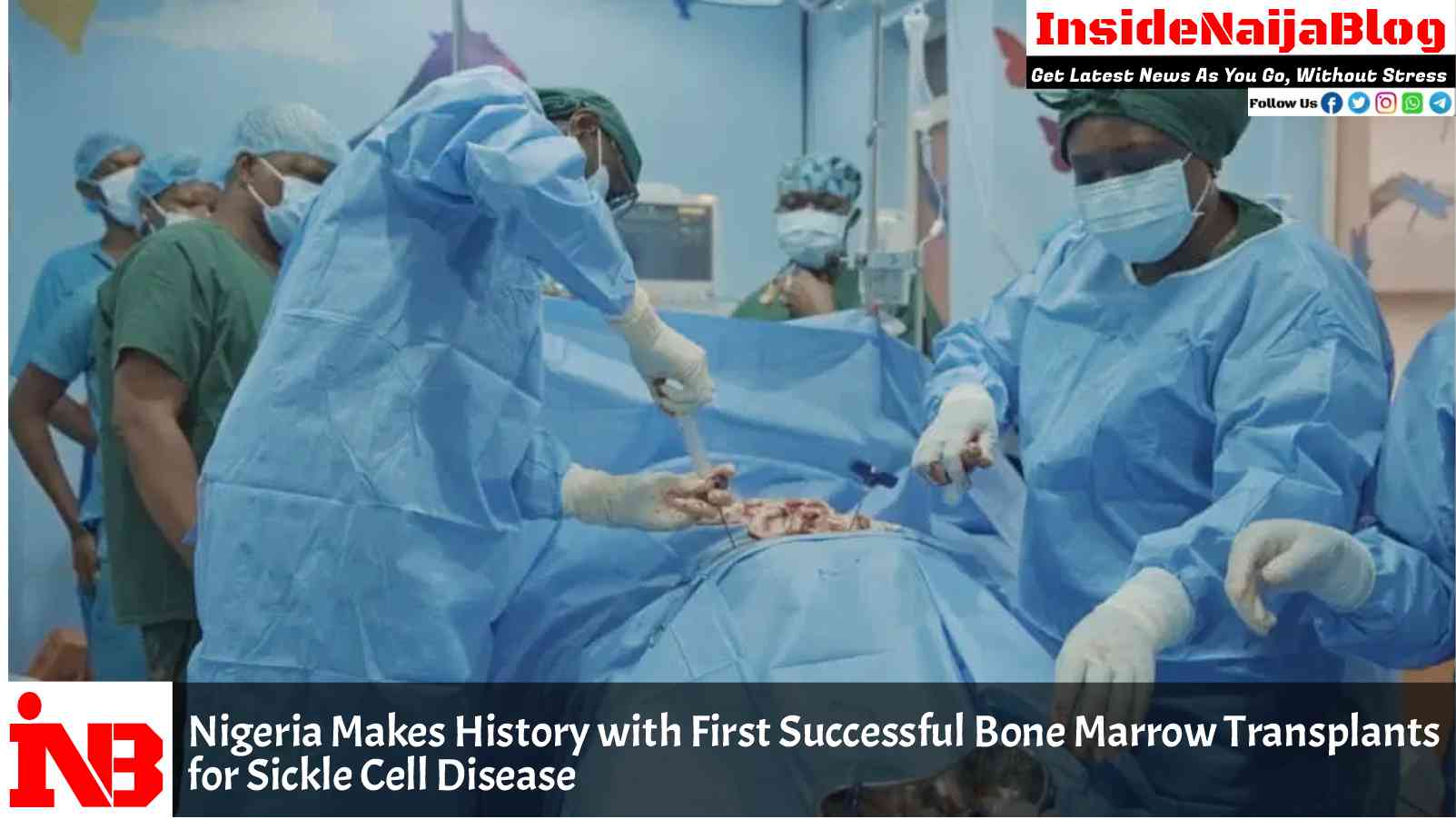For the first time, two sickle cell patients in Nigeria—a child and an adult—have successfully undergone life-saving bone marrow transplants (BMT) at the Sickle Cell Foundation of Nigeria/Lagos University Teaching Hospital (SCFN/LUTH) Bone Marrow Transplant Centre in Lagos. This groundbreaking achievement marks a monumental leap for Nigerian healthcare, making advanced treatments for sickle cell disease available within the country.
A Historic Milestone in Nigerian Healthcare
The SCFN/LUTH Bone Marrow Transplant Centre is now the first facility in West Africa to offer a comprehensive BMT program, a development that has sparked hope for patients and families impacted by sickle cell disease. For years, Nigerians had no option but to travel abroad for costly treatment, facing financial and logistical challenges. But with this achievement, Nigerian patients now have a local solution, bringing accessible care closer to home. This success is especially significant, as Nigeria has one of the world’s highest burdens of sickle cell disease (SCD), with over 150,000 babies born with the disorder each year. Tragically, many do not survive beyond the age of five.
The Path to Success: Rigorous Preparation and State-of-the-Art Care
These pioneering transplants took weeks of detailed planning, including chemotherapy and multiple blood transfusions. Using stem cells harvested from family donors, the medical team infused the bone marrow into the patients. The process required expert precision, as each step—from the harvesting to the post-operative care—was critical for the success of the transplants. Now discharged, the patients remain under observation to ensure their recovery progresses well.
A Vision for Accessible Care: The SCFN Journey
SCFN’s vision for advanced sickle cell treatment in Nigeria dates back to 2009 when Professor Olu Akinyanju founded the Sickle Cell Foundation Nigeria (SCFN) to provide a cure and comprehensive support for those with sickle cell disease. With the help of international partners like the Mediterranean Institute of Haematology (IME) in Rome, 50 Nigerian children received free transplants in Italy. However, this collaboration ended in 2015 due to funding challenges, prompting SCFN to explore solutions within Nigeria.
Undeterred, SCFN teamed up with global experts, including Professor Adetola Kassim of Vanderbilt University Medical Center, to train Nigerian doctors and medical personnel in BMT procedures. Over the years, SCFN has continued to build partnerships with Vanderbilt and the Lagos University Teaching Hospital (LUTH), resulting in the establishment of the first fully operational BMT Centre in Lagos.
SCFN’s Commitment to Affordability and Accessibility
While BMT remains an expensive treatment, SCFN is committed to making it more affordable for Nigerians, especially for the many families who live below the poverty line. Chief Tunde Afolabi, Chairman of SCFN, emphasized the Foundation’s goal to create a sustainable program accessible to all Nigerians affected by SCD. Recognizing the financial challenges many families face, SCFN has launched the Access to Care Programme, a digital platform that connects donors with patients in need of financial support. The platform allows supporters to contribute transparently, tracking the funding and treatment journey of each patient.
Demand and Future Expansion
The BMT Centre has a growing waitlist, with 127 patients already identified as potential candidates for future transplants. SCFN aims to expand its program by partnering with government entities, private sector organizations, and philanthropic donors. Together, these partnerships can help build a sustainable, high-quality treatment model for Nigeria, addressing the pressing need for affordable sickle cell care.
Voices of Hope from Families and Experts
The families of the first patients have expressed deep gratitude. “Our experience was remarkable,” said the mother of one discharged patient, highlighting the attentive, round-the-clock care provided by the medical team. Professor Kassim, who was instrumental in setting up the program, praised the achievement as a model for healthcare in Africa, saying it demonstrates that advanced medical treatments can indeed be made accessible within the region.
Global and Local Collaboration at Work
SCFN and LUTH’s collaboration with Vanderbilt University Medical Center has set the foundation for a world-class BMT program in Nigeria. Training for Nigerian doctors, nurses, and specialists at Vanderbilt and in other countries has enhanced local expertise, ensuring that Nigerian medical staff can now handle these complex procedures independently. Through the generous support of organizations such as NNPC/Chevron, and with funding from the Lagos State Government, SCFN transformed the Olikoye Ransome-Kuti Children’s Emergency Centre at LUTH into a cutting-edge BMT facility.
The Broader Impact: A Cure for Sickle Cell Disease in Africa
In addition to bringing hope to Nigerian families, the SCFN/LUTH BMT Centre is positioned to serve as a leading medical center in West Africa, setting a new standard in hematology-oncology. The Centre provides an accessible cure for SCD, a disease that has long been a public health challenge in sub-Saharan Africa, where roughly 70% of sickle cell births occur. In Nigeria alone, about 150,000 babies are born annually with SCD, and over 100,000 children die before age five due to inadequate care.
Looking Ahead
With a solid foundation, SCFN is poised to expand its capacity, aiming to increase the number of patients who can receive this life-saving cure each year. Dr. Annette Akinsete, CEO/National Director of SCFN, affirmed that the Centre’s mission is to provide safe, quality healthcare to all Nigerians. The ultimate goal is to make BMT a viable and widely accessible option, one that does not depend on costly foreign travel.
The SCFN/LUTH Bone Marrow Transplant Centre is a beacon of hope, a testament to what local healthcare systems can achieve through dedication, collaboration, and a commitment to making advanced treatments available to those who need them most. This success not only saves lives but also redefines Nigeria’s place on the global healthcare stage, showing that groundbreaking medical care is now a reality for Nigerians fighting sickle cell disease.




